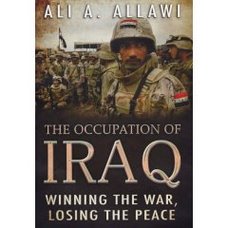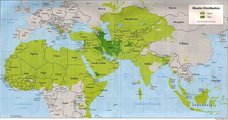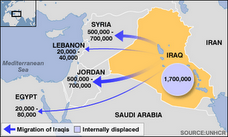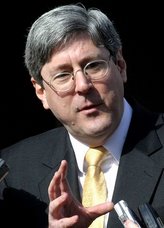UPDATE: The number has now risen to 150...
By YAHYA BARZANJI, Associated Press Writer
TUZ KHORMATO, Iraq (AP) - A string of suicide bombings killed at least 73 people and wounded dozens in Shiite villages north of Baghdad, including a large truck bombing Saturday that ripped through an outdoor market and buried victims in rubble, officials said. The quick succession of blasts within hours of each other suggested that Sunni militants are regrouping to launch their deadliest form of attack - suicide explosions, often against Shiites - in regions further away from Baghdad, beyond the edges of a three-week old U.S. offensive on the capital's northern flank. The U.S. military on Saturday also reported that six American service members were killed in fighting in Baghdad and western Anbar province over two days, reflecting the increased U.S. death toll that has come with the new offensives.
Saturday's blast, at around 8:30 a.m., destroyed several mud homes in the village of Armili, and victims had to be transported in farmers' pickup trucks to the nearest health facility, in Tuz Khormato, 27 miles to the north, said Capt. Soran Ali of the Tuz Khormato police. Police said one man fled the truck before it detonated with another man still inside. Saleh Ali, a medic at Tuz Khormato hospital, said 25 dead and 100 wounded were brought to the facility. Residents of the village said more victims remained trapped under destroyed houses and shops, and doctors said many of the wounded were in critical condition, meaning the toll could rise. ``Some are still under the rubble with no one to help them. There are no ambulances to evacuate the victims,'' said Haitham Hadad, a resident who evacuated his wounded cousin in his car to Tuz Khormato hospital. Dozens of weeping relatives of victims crowded the hospital, searching for loved ones.
``I saw destruction everywhere, dozens of cars destroyed, about 15 shops and many houses, even some more than 700 meters (yards) away,'' said Haitham Yalman, whose daughter and sister were wounded.
The village, 100 miles north of Baghdad is mainly made up of Shiite Turkomen, an ethnic minority that is spread across north-central Iraq, though most of its members are Sunni Muslim.
The night before, a suicide bomber detonated a boobytrapped car at around 9:30 pm outside a cafe near a market stocking Iranian goods in the Shiite Kurdish village of Ahmad Marif, killing 26 and wounding 33, said an official at the joint security coordination committee of Diyala province, who spoke on condition of anonymity because he was not authorized to speak to the media.
The village - 85 miles northeast of Baghdad in a remote corner of Diyala province - is home to about 30 Kurdish families who had been expelled under Saddam Hussein's rule and returned after his fall. Many Kurds in the area are Shiite Muslims.
A half hour after that blast, a suicide bomber detonated an explosives belt in a funeral tent in another Shiite Kurdish village, Zargosh, west of Ahmad Marif. The blast killed 22 people and wounded 17 others, said the head of Diyala provincial council, Ibrahim Bajilan, and a police official in the provincial capital of Baqouba, who spoke on condition of anonymity because he was not authorized to talk to the media.
The new back-to-back bombings could mean the militants have moved a step away from the capital, but still are able to unleash attacks in a region where Iraqi and American security forces are far lighter. ``Because of the recent American military operations, terrorists found a good hideout in Salahuddin province, especially in the outskirts areas in which there isn't enough number of military forces there,'' said Ahmed al-Jubouri, an aide of the province's governor.
Armili, the village hit Saturday morning, is on the edge of Salahuddin province, near the border with Diyala.
The U.S. military on Saturday announced the deaths of six U.S. service members in combat, most in the Baghdad area. Two soldiers died Friday when a roadside bomb exploded near their patrol in east Baghdad, the military said. A U.S. soldier and an Iraqi interpreter were killed Friday when an explosively formed penetrator exploded near their patrol in southeastern Baghdad. Explosively formed penetrators are high-tech bombs that the U.S. believes are provided by Iran, a charge denied by Tehran.
On Thursday, two Marines were killed in western Anbar province and a soldier died in Baghdad, the latest military statement said. Another soldier died Friday of a non-battle-related cause and his death is under investigation, the military said without giving further details. The deaths bring to 3,599 the number of members of the U.S. military who have died since the beginning of the Iraq war in March 2003, according to an Associated Press count.
While violence has continued elsewhere, attacks on civilians - particularly car bombings - appear to have eased somewhat in Baghdad in recent weeks, and residents in some districts have felt safe enough to keep shops open later. By midafternoon Saturday, there had been no police reports of civilian deaths in the city.
In the far south of Iraq, British troops came under heavy attack by militants in Basra, killing one soldier and wounding three, the British military said Saturday. The troops were hit by bombs, rocket-propelled grenades and small arms during an arrest operation in the city before dawn, the military said in a statement. Coalition aircraft destroyed roadside bombs as the British soldiers were extracted from the city, it said.
Britain has withdrawn hundreds of troops from Iraq, leaving a force of around 5,500 based mainly on the fringes of Basra, Iraq's second-largest city, 340 miles southeast of Baghdad. British bases come under frequent mortar attacks from Shiite militias. The U.S. currently has about 155,000 troops in Iraq.
Saturday, July 7, 2007
Subscribe to:
Post Comments (Atom)





No comments:
Post a Comment